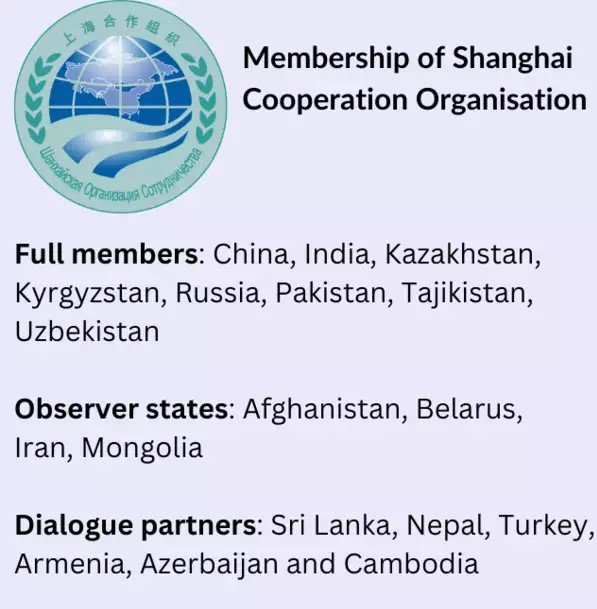International Relations, UPSC
Q.9. ‘Virus of conflict is affecting the functioning of the SCO.’ In the light of the above statement point out the role of India in mitigating the problems. [UPSC 2023 GS P-2]
The Shanghai Cooperation Organization (SCO) is a Eurasian political, economic, and security alliance. While the SCO aims to promote cooperation and peace, it has faced challenges due to conflicts among member states, such as territorial disputes and geopolitical rivalries. India’s role in mitigating these problems is crucial, given its strategic position and influence. Here’s an analysis of the situation and India’s potential role:
Challenges within the SCO
- Geopolitical Rivalries:
- China-India Tensions: Border disputes and competition for regional influence between China and India.
- Russia-West Relations: Russia’s strained relations with Western countries affect its interactions within the SCO.
- Regional Conflicts:
- India-Pakistan Conflict: Historical and ongoing disputes between India and Pakistan, including issues related to Kashmir.
- Central Asian Instability: Internal political instability and economic challenges in Central Asian member states.
- Economic Disparities:
- Diverse Economic Interests: Different economic priorities and development levels among member states can lead to conflicting interests.
- Belt and Road Initiative (BRI): China’s BRI can create economic dependencies and geopolitical tensions.
India’s Role in Mitigating Problems
- Diplomatic Engagement:
- Bilateral Talks: India can engage in bilateral dialogues with member states, particularly China and Pakistan, to address specific disputes and build trust.
- Mediation Efforts: India can offer to mediate conflicts, leveraging its diplomatic relationships and status as a non-aligned country.
- Promoting Economic Cooperation:
- Trade Agreements: India can push for multilateral trade agreements within the SCO to enhance economic interdependence and reduce tensions.
- Connectivity Projects: Investing in regional connectivity projects that benefit all members, promoting mutual economic growth.
- Security Collaboration:
- Counter-Terrorism Initiatives: Strengthening collaborative efforts in counter-terrorism and intelligence sharing to address common security threats.
- Military Exercises: Participating in joint military exercises to build trust and interoperability among member states’ armed forces.
- Cultural and People-to-People Exchanges:
- Cultural Diplomacy: Promoting cultural exchanges and cooperation in education, tourism, and sports to build goodwill and understanding.
- Civil Society Engagement: Encouraging civil society organizations to foster dialogue and cooperation at the grassroots level.
- Policy Advocacy:
- Common Frameworks: Advocating for the development of common frameworks and norms within the SCO to manage conflicts and enhance cooperation.
- Non-Aligned Approach: Leveraging its non-aligned stance to act as a neutral party, promoting balanced and fair resolutions to conflicts.
Conclusion
India’s role in mitigating conflicts within the SCO is vital for the organization’s stability and effectiveness. By leveraging its diplomatic, economic, and cultural strengths, India can help address the underlying issues that fuel conflicts. Through proactive engagement and cooperation, India can contribute to transforming the SCO into a more cohesive and collaborative regional organization, ultimately benefiting all member states.


